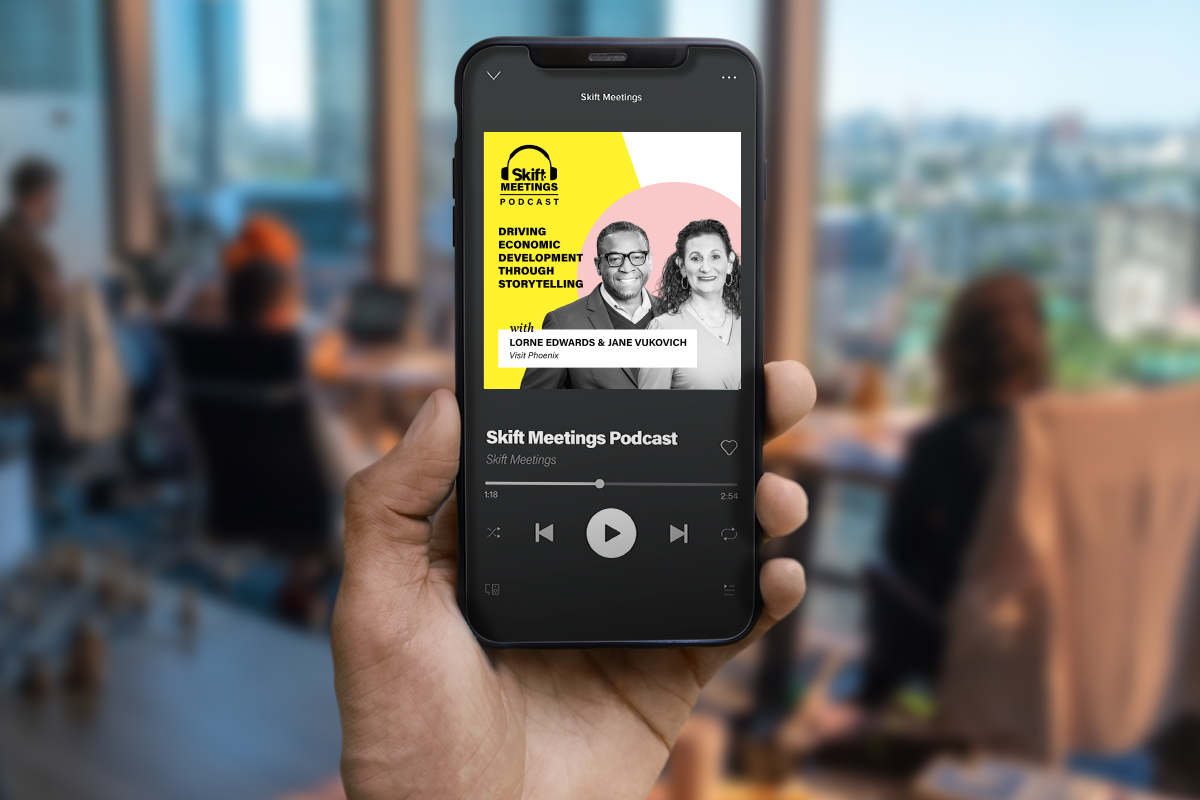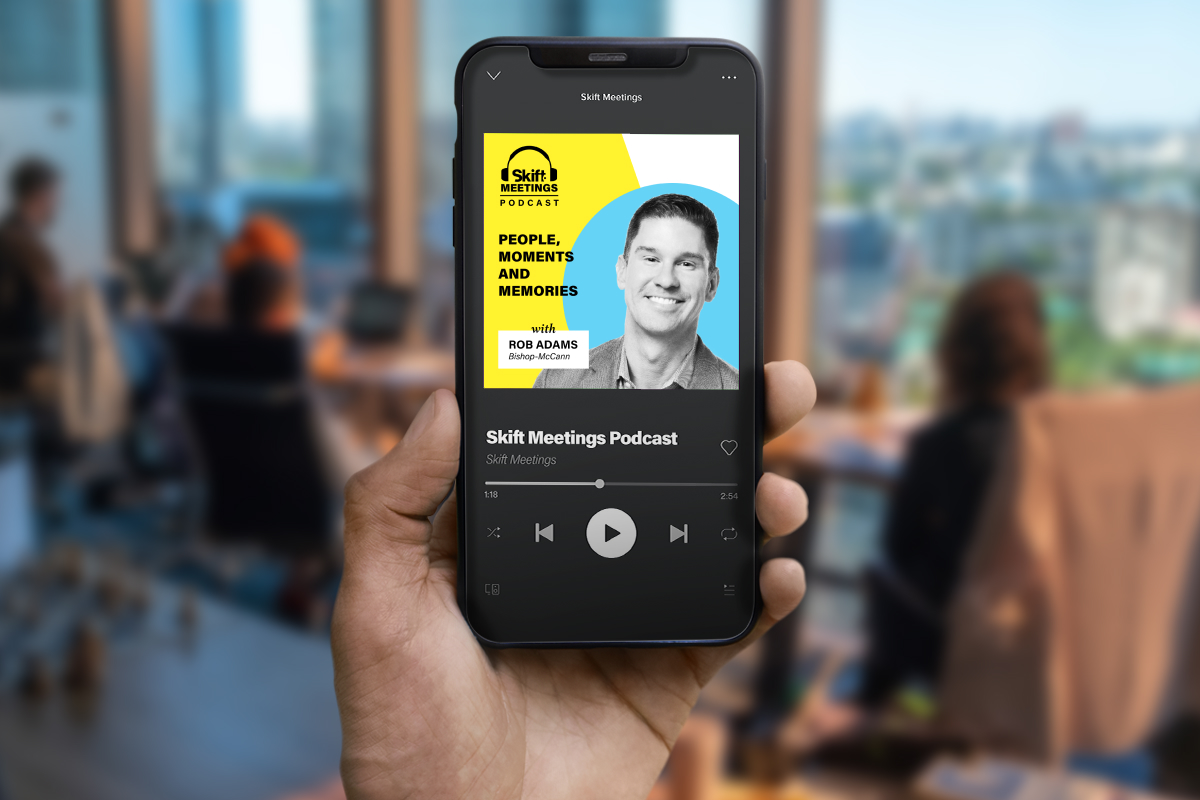Skift Take
In this episode of the Event Manager Podcast we’re joined by Eric Holmen, CEO of Splash. We discuss the true value of smaller events, in particular event marketing and the importance of small scale meetings for business.
Eric began his career in the catalog industry and transferred those skills over from print to digital media, shifting his focus to marketing technology, allowing brands to engage current and future customers. Two and a half years ago, five weeks before NYC shut down due to COVID-19, he joined Splash and began his next career venture, this time into event technology. He moved to Splash as their Chief Revenue Officer (CRO) and then moved into the role of CEO in June 2021, taking over from Splash’s founder. Holmen discusses his first foray into events, which took place in the 90’s during his time at Sears, what he learned from this experience, including the importance of events. He discovered Splash around seven years ago as a customer before he moved to the company.
As someone that didn’t begin his career in the events industry, Holmen notes that explaining his current role to others, such as friends and family, can be difficult because people have so many different preconceptions as to what an event is. He notes the concept of events can apply to so many different types of gatherings, ranging from anything such as a birthday party or wedding all the way to trade shows, conferences, and everything in between.
For Holmen, he feels that design is at the heart of Splash, adding that it is important to impress guests with great design. Holmen adds that design elements, whether this be emails, websites, thank you notes, registration forms or anything else, help to differentiate your event from all the others out there, therefore it is important to get these right as failing to do so could result in failing to convert interested parties into actual attendees. As Holmen notes, this isn’t just something that should be accessible to large organizations hosting large events, but to all businesses sizes regardless of the event they are planning.
Splash is a Softwear-as-a-Service (SaaS) business and Holmen believes that trying to create a SaaS business within the marketing technology industry is very difficult. He explains that the SaaS model is that of an annual license, thus requiring businesses to commit to an annual spend for that year. The difficulty for this model within this industry, and specifically within the events industry, is that most organizations focus on their main, annually held large events and as such they question the need for a software which is available daily for these events. With this in mind, Splash decided to focus its attention on those larger organizations that host numerous small and medium sized events throughout the year.
Subscribe to the Skift Meetings Podcast: Apple Podcasts | Spotify | Overcast | Pocket Casts | Google Podcasts | Amazon | RSS
Speaking of larger events, Holmen believes that the smaller and medium sized events are in fact outperforming those larger events on the calendar. Skift Meetings recently ran an article which dove into the attendee numbers at events now that we are returning to in-person. The article noted that attendee numbers are stalling at 65% across the board if compared to pre-pandemic numbers. Holmen and his team found this interesting, as the data they had was not aligned with this reporting. This prompted Holmen to instruct his team to dive into Splash’s data, allowing them to better understand how their events were performing. Splash focused on their smaller events, which average around 70 – 150 attendees, with Holmen laying out some of their findings, including that attendee numbers were on-par with those events that took place before the pandemic, and as such were performing better than those larger events that have been returning in 2022. Holmen discusses what he and his team take away from this data, noting that above all, small events still have a lot of value.
Holmen also notes that, in his opinion, large events were experiencing issues before the pandemic and the fact that we were able to survive without them for over two years shows that, whilst by no means signals the end of large events, it does signify that there is work to be done by large events with regards to execution and providing value to the attendee. Holmen expands on what he thinks larger events could look to improve on or change moving forward and his thinking behind these suggestions.
Considering the future, Holmen would like businesses to understand the importance of data and Return on Investment (ROI) insights, noting that ROI goes through the entire business and, if utilized correctly, can help improve the next event. Holmen believe that this hasn’t been a priority thus far for a variety of reasons; event planners are incredibly busy and don’t have the time to dig into these insights; the events that are of a bespoke nature and thus the focus has been on creating and executing these, before instantly moving on to the next. Referring to the former, Holmen is happy to see an increase in roles such as Marketing Operations, as those in positions such as these will be focusing on this data and ensuring that there is accountability to the numbers, measuring the actual numbers against projected figures, creating a plan to get these and improving any issues that are preventing the business from reaching these goals, all of which Holmen is excited about.
You can listen to all our episodes via your favourite podcasting app. Why not hit the subscribe button to ensure you never miss a new episode.





